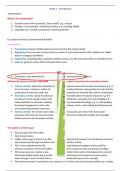Week 1 - Introduction
‘Home planet’
What is the relationship?
1. Sustains human life by meeting “basic needs” e.g. a house
2. Provides “non-essential” material provisions e.g. watching Netflix
3. Inspiration for “socially constructed” needs and desires
Eco System Services /Environmental Benefits
4 categories:
1. Provisioning: humans taking material resources from the natural world
2. Regulating: the ecosystem services that we construct and understand to offer a balance or stable
state in ecological conditions
3. Supporting: something that underpins another process e.g. the way water flows is needed by trees
4. Cultural: going to a place that feels important to you
Economics is the allocation of environmental resources
All financial, physical, human, and social capital is premised on ecosystem services
Primary activity: about the extraction of natural resources from the environment e.g. in
terms of water, nutrients, carbon to produce biomass, the growing of crops and the
production of food and cattle, the extraction of minerals like coal for combustion
Secondary activity: about the physical transformation of natural resources e.g. the
burning of coal to produce steam and electricity, extracting iron and smelting it to
make machines for factories, building non-essential technology e.g. tv, also building
the physical equipment used in the primary sector, and cooking food (because we
are transforming natural resources)
Tertiary activity: the service sector like a restaurant can’t exist if the food wasn’t
processed, the food can’t be processed if it wasn’t extracted; tertiary isn’t possible
without primary and secondary activity
The planet is a finite space
Solar energy enters the earth
Heat energy leaves
Matter and energy is drawn from the natural environment into the human economy,
and is processed through secondary and tertiary activity
This is also underpinned by the regulating and support services and the
cultural ecosystem services that allow the economy to exist e.g. going on holiday
Th human economy creates waste matter that needs to be disposed of, some of
which gets broken down and recycled, and we know the human economy ejects
waste energy in terms of heat from a production process for example
The human economy is essential to our concern as it is where we derive human welfare as a society
, As the human population grows, there are more individuals demanding welfare
, At some point, the human economy will fill the entirety of the finite system of the planet
The Anthropocene: Are we in it?
Now, unlike before, the dominating factor shaping the nature and physicality of our planet is
humans, hence the idea of the Anthropocene
Animals are becoming extinct because of us
The reason (Sustainable) Development continues to fail?
Longstanding environmental concern – when did we realise?
Religious and spiritual traditions: Religions and cultures realised the connection between the
species and the natural world.
A lot of cultures had respect for the world, and some saw it as their responsibility to make use of
the natural world
Colonial interactions show knowledge and regulation
1799-1804 Humboldt: reflects on environmental impact of ‘development’ in Latin America
(Zimmerer 2006)
165 years go in 1856, someone first came up with the idea that CO2 is a heat trap (Smith,2019)
There has been a transition from “needs” to “desires”
GSD Agenda
“A point has been reached in history when we must shape our actions throughout the world with a more
prudent care for their environmental consequences. Through ignorance or indifference we can do massive
and irreversible harm to the earthly environment on which our life and well being depend. Conversely,
through fuller knowledge and wiser action, we can achieve for ourselves and our posterity a better life in
an environment more in keeping with human needs and hopes “ (Stockholm, 9172).
"Sustainable development is development that meets the needs of the present, without compromising the
ability of future
generations to meet
their own needs”
(WCED 1987: 41).
The
environment should be
the outer layer of the
Venn diagram, the
one below shouldn’t be
used 😊
, Influenced by the Limits to Growth Report
There are limits to economic growth that are “imposed by the present state of technology and
social organization on environmental resources…But technology and social organization can be
both managed and improved to make way for a new era of economic growth” (Meadows et
al.1972.)
Environmental concerns directly make up 4 of the SDGs being 7,13, 14 add 15. You could also argue that
the environment can be connected to goal 12, "responsible consumption and production" whereby it
comes down to the ability of humans to reduce the demand for scarce resources, and so in the long term
reduce the environmental harm associated with those particular resources. The SDGs implementation of
the major environmental concerns would massively assist in the movement towards a more
environmentally sustainable planet, although it comes down to the ability of humans to successfully
execute these goals before the "sustainable limits have been overshot"(Randers, 2012).
Weak/soft sustainable development
Soft sustainable development – all capital is substitutable so preservation of total capital available
e.g. you can extract oil and heavy metals and add it to existing capital to create energy; and then
build photovoltaic cells to get renewable energy
Strong sustainable development
Raw material is always needed
Raw materials are substitutable but ultimately finite
- Trees are renewable but take long to grow
- Compounds can be created and substituted
- Atoms cant be created or destroyed
Waste sinks are finite because there’s only so much land of which you can put waste on
Electric cars still require specific metals from the earth with need to be extracted and produced in
the secondary sector
We should be heading towards an ice age, but we are not




